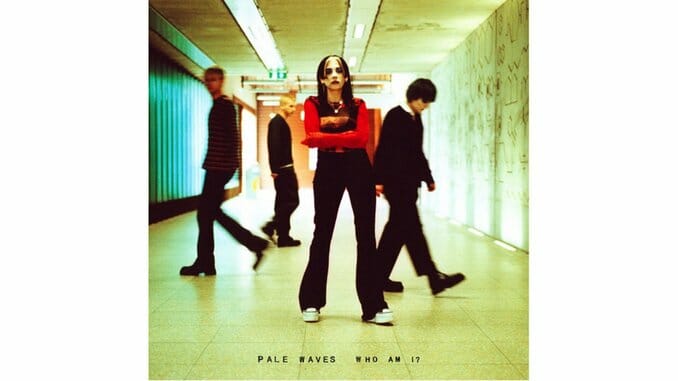Pale Waves Come into Their Own on Who Am I?

Identity has been a hot topic surrounding Pale Waves from the band’s very beginning. They had the dark, brooding look of an ‘80s goth act, but a discography full of danceable pop hits. Even while receiving acclaim as the NME Under The Radar Award winner before their debut album’s release, they caught heat from critics for sounding too much like other indie-pop artists. With all of the discourse on the individuality of Pale Waves (or lack thereof), their second album Who Am I? amplifies the qualities that caused fans to label them as the next big thing: a brilliant ability to blend catchy indie pop/rock with witty, yet vulnerable lyrics.
Who Am I? opens with “Change,” a track that trades the ‘80s glam synths of Pale Waves’ debut album My Mind Makes Noises in for a ‘90s-inspired acoustic guitar. The switch-up is perfect for frontwoman Heather Baron-Gracie’s vocal prowess, with the singer’s voice landing somewhere between the pop-with-an-attitude of Avril Lavigne and the raw emotion of The Cranberries’ Dolores O’Riordan. This isn’t to say Pale Waves floats by on the nostalgia factor alone—the band translates their many inspirations into their own brand of indie pop that feels perfectly fit for 2021, with their lyrics bouncing between relationships, identity and mental health.
On an album centered around a question of identity, the band is at their strongest when shouting out the answer. Few songs on the record compare to “You Don’t Own Me” in terms of pure anthemic pop-rock, as Baron-Gracie defiantly asserts, “You don’t own me / and I’ll do whatever I want to” in the face of everyday misogyny.
“She’s My Religion” is a revolutionary step in ownership of identity for both Pale Waves and Baron-Gracie herself, unlike anything they’ve tackled before. Previously, the songwriter’s catalogue felt like flipping through a collection of diary entries or love notes, as every other romantic song was written with the gender-neutral “you.” “She’s My Religion” is instead explicitly about a romantic relationship between two women, a relationship in which each celebrates even the less-desirable qualities of the other: “She’s mad and she will never change / She’s no angel, but she is my religion.”
-

-

-

-

- Curated Home Page Articles By Test Admin October 21, 2025 | 3:10pm
-

- Curated Home Page Articles By Test Admin October 21, 2025 | 2:57pm
- Urls By Test Admin October 21, 2025 | 2:57pm
- Curated Home Page Articles By Test Admin October 21, 2025 | 2:55pm
-

-

-

-

-

-

-

-

-

-

-

-

-

-

-

-

-

-

-

-

-

-

-

-

-

-

-

-

-

-

-




































